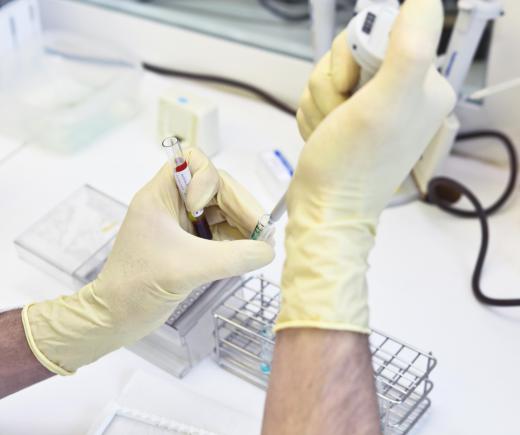What is Clinical Biochemistry?
 Mary Elizabeth
Mary Elizabeth
Clinical biochemistry is the area of biochemistry focused on body chemistry. It is also known by several other names, including medical biochemistry, chemical pathology, clinical chemistry, and pure blood chemistry. The term clinical biochemistry is favored in the UK, Australia, New Zealand, and Canada. The terms clinical chemistry and chemical pathology are used more widely in the United States. Clinical biochemistry refers to the application of biochemical techniques to the diagnosis, management, and study of diseases.
Clinical biochemistry is an area of pathology. The subspecialties of pathology include blood banking and transfusion medicine; chemical pathology, cytopathology, dermatopathology, forensic pathology, hematology, medical microbiology, molecular genetic pathology, neuropathology, and pediatric pathology.

In a hospital, the chemical pathology services may be configured differently than the subspecialties, but by one name or another, clinical biochemistry will be among them. The service sectors of pathology at John Hopkins University, for example, are Blood Disorders & Special Coagulation, Clinical Chemistry, Cytokine, HIV Specialty Services, Immunology, Medical Microbiology, Molecular Pathology & Cytogenetics, Neoplastic Hematopathology & Flow Cytometry, and Transfusion Medicine. Hospital clinical biochemistry services are provided by a team of individuals.

Clinical biochemistry is also an academic area that one can study as a major or a minor. for one’s bachelor’s degree or at the graduate level. Standard subtopics include biochemical pathologies; enzyme kinetics; immunochemistry; lipid, protein, and carbohydrate testing; toxicology and drug testing; and tumor marking.
To practice clinical chemistry in the United States, requires certification by the American Board of Clinical Chemistry. The requirements include general qualifications, educational requirements, professional experience requirements, an examination, and an application and payment of a fee. One is required to be “of good moral character and high ethical and professional standing,” in addition to having a doctorate or an MD from an accredited university or college. Undergraduate coursework if required as well. Five years full-time experience and two years of full-time post-doctoral training approved by the Commission on Accreditation in Clinical Chemistry is also required, and one must take a comprehensive written examination. Clinical biochemists in the UK, for example, have a career path marked out within the NHS, beginning as a Trainee and ending with Principal Biochemist (Band 8a).
AS FEATURED ON:
AS FEATURED ON:















Discuss this Article
Post your comments